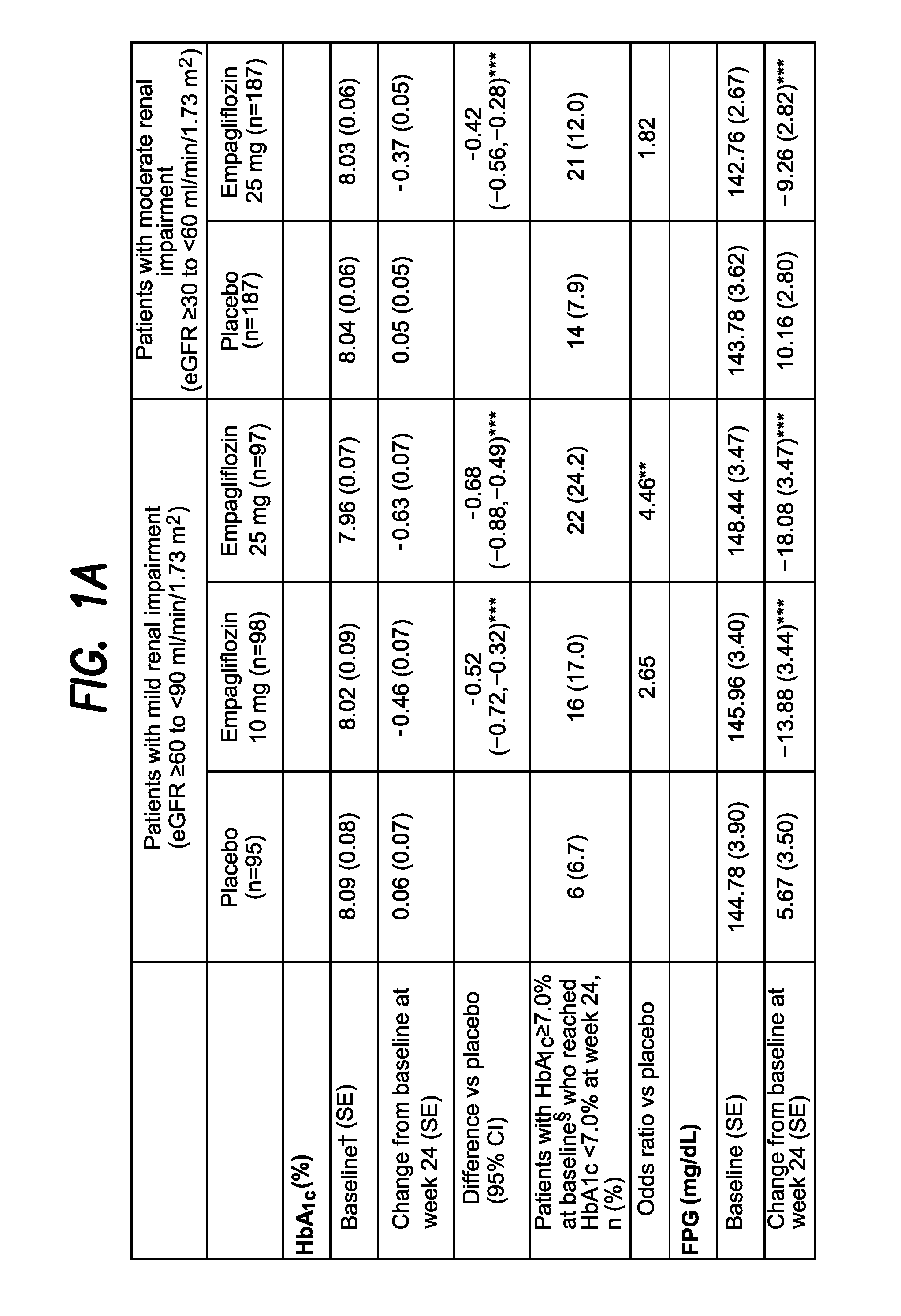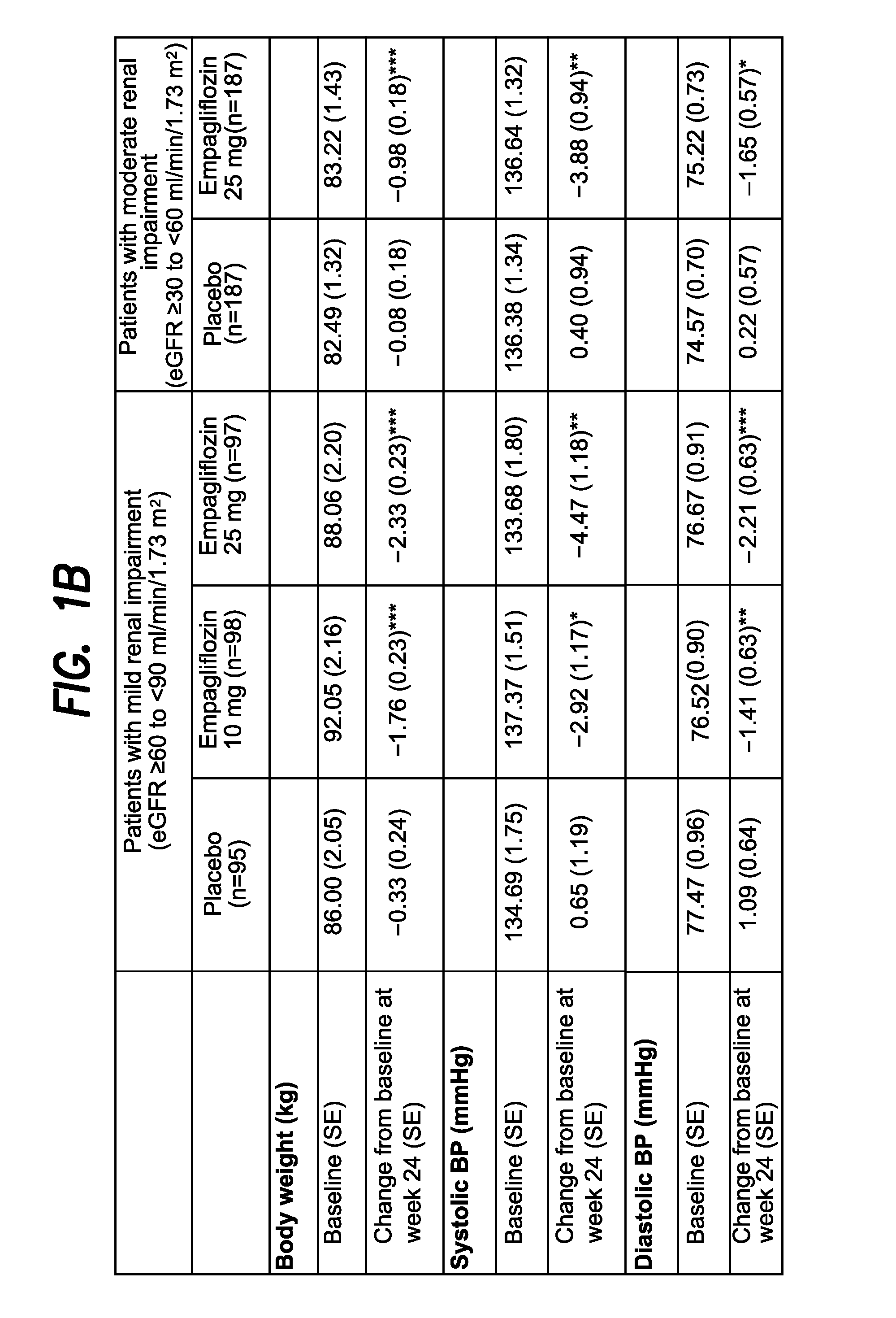Pharmaceutical composition, methods for treating and uses thereof
a technology of pharmaceutical compositions and inhibitors, applied in the field of sglt2 inhibitors, can solve the problems of restricted use of anti-diabetes agents, and achieve the effect of reducing the risk
- Summary
- Abstract
- Description
- Claims
- Application Information
AI Technical Summary
Benefits of technology
Problems solved by technology
Method used
Image
Examples
example 1
Empagliflozin in Patients with Type 2 Diabetes Mellitus (T2DM) and Renal Impairment (RI)
[0360]A Phase III trial investigated the efficacy and safety of empagliflozin (EMPA) as add-on to existing therapy for 52 weeks in patients with T2DM and RI. Patients with mild RI (eGFR [MDRD equation]≧60 to 2; n=290; mean age 62.6 years; mean BMI 31.5 kg / m2) received EMPA 10 or 25 mg qd or placebo (PBO). Patients with moderate RI (eGFR ≧30 to 2; n=374; mean age 64.9 years; mean BMI 30.2 kg / m2) received EMPA 25 mg qd or PBO. The primary endpoint was change from baseline in HbA1c at week 24. Exploratory endpoints included changes from baseline in fasting plasma glucose (FPG), weight and blood pressure (BP) at week 24 (FIG. 1).
[0361]EMPA significantly reduced HbA1c vs PBO at week 24. Further analyses showed significant reductions in FPG, weight and BP. At week 24, adverse events (AEs) were reported by 79.6%, 75.4% and 72.7% of all patients (including an exploratory group with severe RI [n=74] on EM...
example 2
Mixed Effects Modeling to Quantify the Effect of Empagliflozin Exposure on the Renal Glucose Threshold in Patients with Type 2 Diabetes Mellitus
[0364]Empagliflozin, a selective and potent SGLT2 inhibitor, reduces renal glucose reabsorption by lowering the renal threshold for glucose (RTG) leading to increased urinary glucose excretion (UGE) and decreased plasma glucose (PG) in patients with type 2 diabetes mellitus (T2DM). This analysis aimed to quantify the impact of empagliflozin on RTG by characterizing the relationship between empagliflozin exposure and UGE in patients with T2DM using nonlinear mixed-effects modeling.
[0365]A pharmacokinetic (PK)-pharmacodynamic (PD) model was developed using UGE, PG, PK and estimated glomerular filtration rate (eGFR) data from three Phase I / II trials (N=223; placebo, empagliflozin 1 to 100 mg once daily [QD]). The model assumed that when PG>RTG, UGE increased with increasing PG and eGFR; and when PG≦RTG slight glucose leakage into urine occurred...
example 3
Pharmacokinetics and Pharmacodynamics of Empagliflozin in Subjects with Renal Impairment
[0367]Subjects.
[0368]Male and female subjects aged 18 to 75 years weighing at least 45 kg (females only) and with a body mass index (BMI) of 18 to 34 kg / m2 were eligible for inclusion in this study. Participants with normal renal function (eGFR >90 mL / min / 1.73 m2; control) were required to have T2DM. Patients with mild renal impairment (eGFR 60-89 mL / min / 1.73 m2), moderate renal impairment (eGFR 30-59 mL / min / 1.73 m2), severe renal impairment (eGFR 2) or renal failure / ESRD (requiring dialysis) did not need to have T2DM. eGFR was calculated using the Modification of Diet in Renal Disease (MDRD) formula: 186×serum creatinine1.154×age0.203×[0.742 if female].
[0369]Subjects were excluded from the study if they had recently participated in a study (multiple-dose: within 2 months; single-dose: within 1 month), were abusing alcohol (males >60 g / day; females >40 g / day) or drugs, had donated >100 mL blood i...
PUM
| Property | Measurement | Unit |
|---|---|---|
| waist circumference | aaaaa | aaaaa |
| waist circumference | aaaaa | aaaaa |
| waist circumference | aaaaa | aaaaa |
Abstract
Description
Claims
Application Information
 Login to View More
Login to View More - R&D
- Intellectual Property
- Life Sciences
- Materials
- Tech Scout
- Unparalleled Data Quality
- Higher Quality Content
- 60% Fewer Hallucinations
Browse by: Latest US Patents, China's latest patents, Technical Efficacy Thesaurus, Application Domain, Technology Topic, Popular Technical Reports.
© 2025 PatSnap. All rights reserved.Legal|Privacy policy|Modern Slavery Act Transparency Statement|Sitemap|About US| Contact US: help@patsnap.com



